The British Broadcasting Corporation (BBC) is the world’s largest broadcasting organization, established in 1922. It produces media programs and services broadcast through television, radio, and the internet. Its mission encompasses news, information, and entertainment. Although primarily funded through a government license fee, the BBC operates independently under the terms of its Royal Charter, which ensures it remains free from political and commercial influence. Driven by quality rather than profit, the BBC has become one of the most respected news organizations globally, praised for its impartial and balanced reporting. However, it has faced criticism recently over alleged bias and difficulty competing with other news channels due to limited funding, prompting it to develop new revenue streams through digital and interactive media to ensure continued high-quality broadcasting.
History of the BBC
The original British Broadcasting Company was founded in 1922 by a consortium of private companies to broadcast experimental radio services. Its first broadcast occurred on November 14. It was transformed into the British Broadcasting Corporation in 1927 with John Reith appointed as its Director-General after receiving a Royal Charter. The BBC ceased to be privately owned and began experimental television broadcasting in 1932, becoming a regular service known as the BBC Television Service in 1936, colloquially referred to as “Beeb” by the local audience.
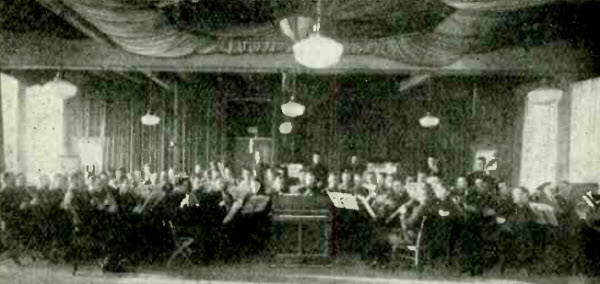
On September 1, 1939, television broadcasts were suspended until June 7, 1946, due to World War II. The BBC entered the media competition in 1955 with the launch of the commercial and independent television channel ITV. In 1964, the BBC introduced a second television channel (BBC Two) and rebranded the original channel as BBC One. Color broadcasting on the second channel began on July 1, 1967.
During the 1980s, following the deregulation of television and radio markets in the UK, the BBC faced increasing competition from the commercial sector, especially from satellite and cable TV and digital TV services. The BBC’s research department played a key role in developing broadcasting and recording technologies, conducting fundamental research in acoustics, program measurement, and adherence to media standards.
BBC Headquarters and Regional Offices
Broadcasting House is the BBC’s headquarters, located in Portland, London. It is the usual home of BBC Radio 2, 3, 4, 6 Music, and 7. Broadcasting House, officially opened on May 14, 1932, features a semi-circular façade with an ornate radio tower. Statues of Prospero and Ariel (from a Shakespeare play) are prominently displayed at the front of the building, chosen deliberately because “Prospero” was a magician and “Ariel” was an air spirit, symbolizing the transmission of radio waves. Broadcasting House also housed the BBC Radio Theatre, where music and drama programs were recorded before a studio audience. By 2005 and 2006, BBC Radio 2 and BBC 6 Music moved their studios to newly built facilities in the adjacent Western House.
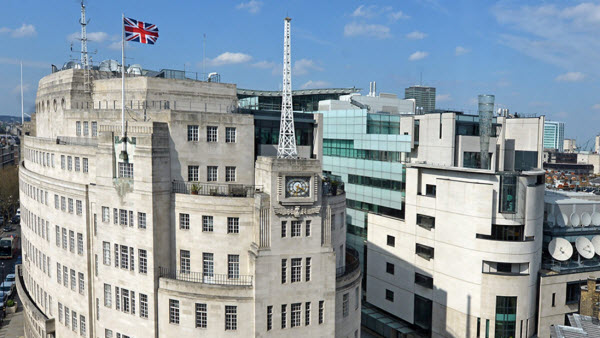
In addition to its many buildings in London, the BBC has major production centers in Cardiff, Belfast, Glasgow, Birmingham, Manchester, Bristol, Southampton, and Newcastle, as well as several smaller local and regional studios throughout the UK, some of which are locally known as “Broadcasting House” in imitation of the London headquarters.
The Royal Charter
The BBC is a public corporation, operating as a public service broadcaster established under a Royal Charter reviewed every ten years by a board of governors appointed by the government. The Charter mandates that the BBC be free from political and commercial influence, answering only to its viewers and listeners. In March 2005, the Culture Secretary published a green paper outlining proposals for the BBC’s future, including increased outsourcing of production and reducing the focus on imitation programs like reality TV.
Management
The BBC is independent of direct government intervention and is managed by a Board of Governors appointed by the government. The Director-General, appointed by the governors, oversees the organization’s general management. The BBC has the largest budget of any broadcasting station in the UK, with an annual budget of approximately £3.8 billion in 2005.
The primary funding source for the BBC is the television license fee, required to operate a television receiver within the UK. The cost of the license fee is set by the government and, as of 2006, was around £11 per month. Revenues are collected privately and do not pass through the state before reaching the BBC, thus maintaining its status as an independent, non-governmental institution.
Services
In addition to its media services, the BBC operates various other ventures within the UK, including book and magazine publishing (BBC Books) and multimedia production services (DVDs and computer games) through BBC Multimedia. The revenue and profits from these services support program production. The BBC also engages in joint ventures for satellite and cable broadcasting serving the US, Canada, and other countries. In 2005, the BBC announced a significant reduction in its Eastern European language broadcasts and a shift of resources to a new Arabic-language television channel.
BBC News
The BBC claims to be the largest radio news gathering organization in the world, providing services to BBC Radio as well as television networks such as BBC News 24, BBC Parliament, BBC World, and BBC News Online. It also offers popular services like mobile news for phones and PDAs, as well as breaking news alerts on desktop computers, email, and digital TV.
The BBC News division is the BBC’s main arm, responsible for news gathering and producing news programs across television, radio, and online platforms. It is the largest news publisher globally, producing nearly 100 hours of content daily. The news department employs 3,500 staff, including 2,000 journalists, with an annual budget of £350 million. BBC News fulfills a primary goal of the BBC’s Royal Charter: to gather news and information from any part of the world in any manner deemed appropriate.
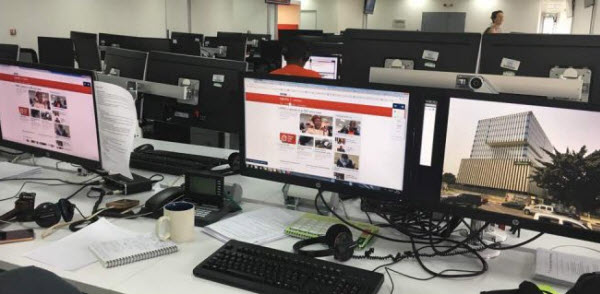
BBC News’ headquarters were initially located at the Television Centre (TVC) in the Wood Lane area of London, with regional centers throughout the UK and 44 news bureaux worldwide. In 2008, the news center moved to the BBC’s Portland headquarters in central London.
The BBC is respected within the UK and many other countries and has been praised for its unbiased and balanced reporting. Studies have shown that during major events like the Iraq War and the September 11 attacks, viewers turned to the BBC. However, the BBC has faced criticism from some commentators for perceived bias and occasionally following directions from British security agencies.
Political and Commercial Independence
Despite the BBC’s Charter requirement to remain free from political and commercial influence and to answer only to its viewers and listeners, its political objectivity is sometimes questioned. For instance, the Daily Telegraph (August 3, 2005) carried a letter from former Soviet KGB agent Oleg Gordievsky, criticizing the BBC as “the Red Service” for its alleged lack of objectivity and perceived alignment with security agencies.
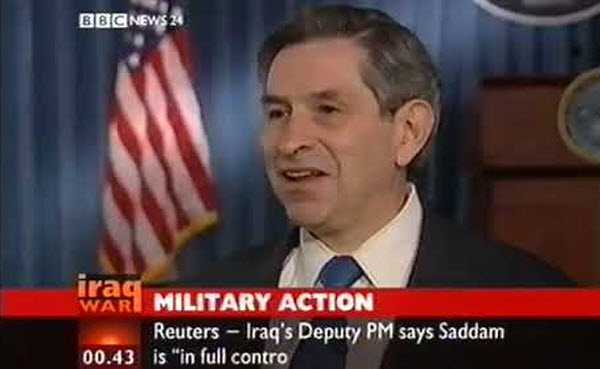
The BBC is regularly accused by the government of bias towards the opposition and by the opposition of bias towards the government. Similarly, during wartime, the UK government or strong proponents of British military campaigns often accuse the BBC of excessive sympathy with the enemy’s viewpoint. During the Gulf War in 1991, it was mockingly referred to as the “Baghdad Broadcasting Corporation.” Conversely, those opposed to British policies or foreign wars have accused the BBC of supporting British policies or failing to provide a platform for anti-war voices. Defenders argue that the BBC presents all views, and it is natural for people to perceive bias when confronted with opposing viewpoints. This argument is supported by the fact that the BBC is often accused of bias from all perspectives, with examples including coverage of the Iraq War and the Israeli-Palestinian conflict.
During the 2003 Iraq invasion, the BBC was accused of pro-war bias, leading to anti-war protests outside its offices. A Cardiff University report found that the BBC presented more pro-war agendas, relied heavily on government or military sources, and somewhat neglected independent sources and Iraqi casualties. In the 2006 Israeli-Palestinian conflict, an independent investigation into the BBC’s neutrality found no bias but suggested that the coverage sometimes provided an incomplete picture that could mislead viewers and affect their understanding of the situation. The report noted that BBC reports inadequately covered the suffering of Palestinian civilians and overly focused on the Israeli perspective.
Due to the coverage by BBC correspondents in various countries, some have faced restrictions and their offices have been closed. For example, reporters were banned by the former apartheid regime in South Africa and by President Robert Mugabe’s administration in Zimbabwe, which initially sought to censor its broadcasts and later banned them, labeling the BBC as a terrorist organization. Similar restrictions have been imposed by other countries such as China, Sri Lanka, and Pakistan.
Radio and Television
BBC Radio operates five main national stations: BBC Radio 1 (focused on new music), BBC Radio 2 (the most listened-to station in the UK with 13.7 million weekly listeners), BBC Radio 3 (specialized music such as classical, world, arts, drama, and jazz), BBC Radio 4 (current affairs, drama, and comedy), and BBC Radio 5 Live and 5 Live Sports.
The BBC also has a network of local stations offering a mix of talk, news, and music in England and the Channel Islands, as well as national stations BBC Radio Wales and BBC Radio Scotland, among others. The BBC World Service, funded by the Foreign Office, broadcasts globally on shortwave radio and is a primary source of news and information for over 140 million listeners worldwide, currently broadcasting in 43 languages and dialects (including English).
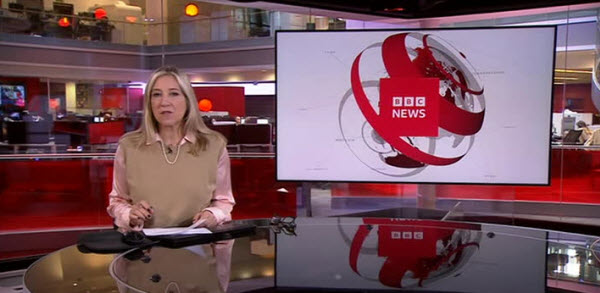
BBC One and BBC Two are the BBC’s flagship television channels, providing regional news and local programming throughout the day, along with BBC Three and BBC Four, which are only available through digital television equipment (which has been widely adopted in the UK since the switch from analog broadcasting in 2012 .
The BBC launched its digital television service, BBC Digital, on November 15, 1998, delivering a combination of free-to-air programming, interactive services, and video-on-demand. The BBC has also introduced several high-definition channels and 3D broadcasts, expanding its media offering.
